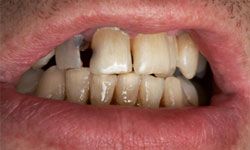Have you ever experienced a jolt of pain when you ate ice cream or sipped hot tea? If so, you may have some level of enamel erosion. A tooth's outermost covering is called enamel. This translucent layer is thin but extremely strong. In fact, it's the hardest tissue in the human body [source: WebMD].
Enamel acts as a protective shell for your teeth. It guards against everyday wear that your teeth endure, like chewing, grinding and biting. It also fortifies your teeth from temperatures or chemicals that can be painful [source: WebMD].
Advertisement
Even though enamel is tough, it can crack, chip or wear away. It contains no living cells, which means it can't repair itself, so once it's gone, the damage is permanent. Teeth can corrode when this protective panel wears down [source: WebMD].
Typically, the more sensitive your teeth are, the more enamel is gone. Enamel erosion is caused by exposure to acids or physical friction that literally rub away your teeth's protective covering. Although genetics can be to blame for weak enamel or conditions that exacerbate erosion -- like acid reflux disease or simply having a dry mouth -- there are actions you can take to protect the enamel you have and prevent more from being worn away.
You may not be able to restore it, but there are easy steps you can take to protect and care for your teeth once your enamel has started to wear.
Read the next page learn why having a dry mouth can be disastrous for your teeth.


